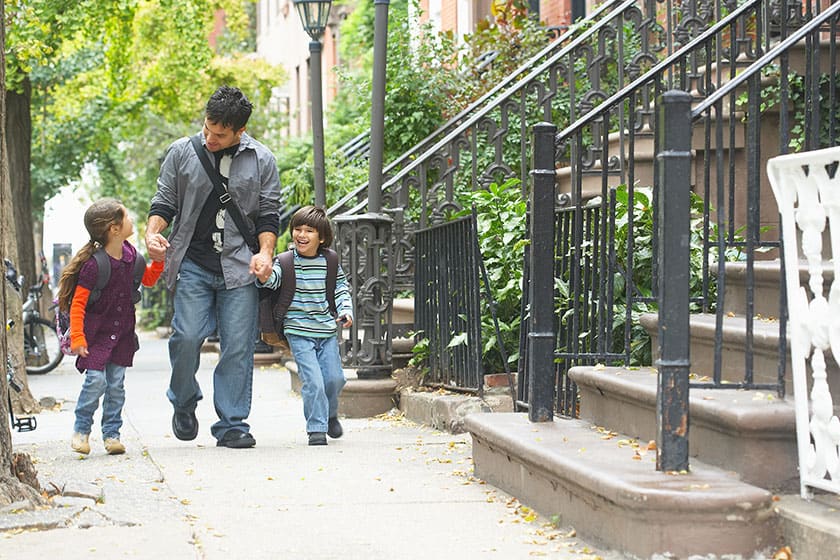Second chances for returning citizens make for safer communities.

When Charles Colson founded Prison Fellowship® in 1976, there were 440,000 men and women behind bars in the United States. Today, there are more than 1.7 million. Nearly, 95% of those incarcerated will one day be released. Therefore, it is vital for society that we invest in reentry.
With more than 44,000 legal barriers to education, housing, employment, transportation, and health care for returning citizens, we need to be prepared to help. Nearly, two-thirds of those released from prison will find themselves rearrested within three years. This cycle of crime and incarceration produces broken relationships, victimization, despair, and instability.
Clearly, increasingly punitive measures are not creating a healthy society. But when we offer true second chances to people who have done their time, communities are safer.
RETURNING AND PRODUCTIVE CITIZENS
The reentry process starts behind bars. Access to education, drug treatment, and other transformative in-prison programs offer incarcerated men and women the chance to change for the better. They allow prisoners to overcome harmful patterns of behavior and learn the Values of Good Citizenship™.
Upon release, returning citizens who were able to make the most of their time in transformative in-prison programs can become productive members of society. We have seen this firsthand: 15% of Prison Fellowship employees were formerly incarcerated. Employees like Jesse, Tammy, and Michelle.
Even so, civic engagement is frequently denied to people with a criminal record. Oftentimes, returning citizens are unable to vote, serve on a jury, or be elected to political office, denying them a chance to speak about the very issues they know firsthand.
SAFER NEIGHBORHOODS
On April 27, 2022, Second Chance® Month partners gathered on Twitter to discuss how second chances can create safer neighborhoods. Here is what they had to say.
Preparing for reentry is vital for society as 95% of prisoners will return to our communities one day. What role does access to education, drug treatment, and other transformative in-prison programs play in community safety?
A2: These programs are critical. Prisoners must have access to the treatment, services, and other resources they need to help turn their lives around and prevent recidivism. Incarceration without rehabilitation does little to improve community safety. #SecondChanceMonth
— Major Cities Chiefs Association (@MjrCitiesChiefs) April 27, 2022
Rehabilitative programs allow prisoners to overcome harmful patterns of behavior to become productive members of society upon release. Share a #SecondChanceShoutout of someone who was formerly incarcerated & now plays an active role in the community!
A3. There’s no better example in our mind than Matthew Charles. After passage of the First Step Act, Matthew has been willing to partner with prosecutors to improve the CJ system & support public safety by joining us in advocating to Congress on needed reforms! #SecondChanceMonth
— NDAA (@ndaajustice) April 27, 2022
People with a criminal record face barriers to education, housing, jobs, transportation, and healthcare. How do these practically impact public safety?
A4. A criminal record reduces a job-seekers chance for employment by 50%- that’s fewer job prospects, less than average earnings, fewer housing options, and fewer educational opportunities. #SecondChanceMonth
— Right On Crime (@RightOnCrime) April 27, 2022
Let’s talk about civic engagement. People with a criminal record, who have served their time, are often unable to vote, serve on a jury, or be elected to political office. How do these limitations hurt public safety goals?
A6. Denying ppl w/ crim records the right to vote is detrimental to rehab and reentry - it’s also just plain wrong. Restoring voting rights brings ppl into the political process & builds incentive to be community contributors & stakeholders. #SecondChanceMonth
— Ana Zamora (@anarzamora) April 27, 2022
From volunteering in prison to advocating for sound #criminaljusticereform policies, we all play a part in maintaining the safety of our communities. What other steps can you take in creating safer neighborhoods today?
A7.Volunteer in your local schools, mentor members of your community who need it, support the amazing nonprofits out there doing great work, educate yourself about how the CJ system works, vote for people advancing effective policy, ask “why” more often. #SecondChanceMonth
— Abigale Jasinsky(@AbigaleJasinsky) April 27, 2022
JOIN THE CONVERSATION
In answer to these issues, Prison Fellowship has led a nationwide campaign known as Second Chance® Month every April since 2017. With more than 700 organizations, congregations, and businesses, Prison Fellowship is raising awareness and unlocking brighter futures for the tens of millions of Americans with a criminal record.
Throughout April 2022, we hosted weekly Twitter chats with some of our partners to discuss the major issues many returning citizens face.
APRIL IS SECOND CHANCE MONTH!
Fifteen states have officially recognized April 2022 as Second Chance Month. Add your voice and ask your senators to declare April as Second Chance Month!
DID YOU ENJOY THIS ARTICLE?
Make sure you don' t miss out on any of our helpful articles and incredible transformation stories! Sign up to receive our weekly newsletter, and you' ll get great content delivered directly to your inbox.
Your privacy is safe with us. We will never sell, trade, or share your personal information.